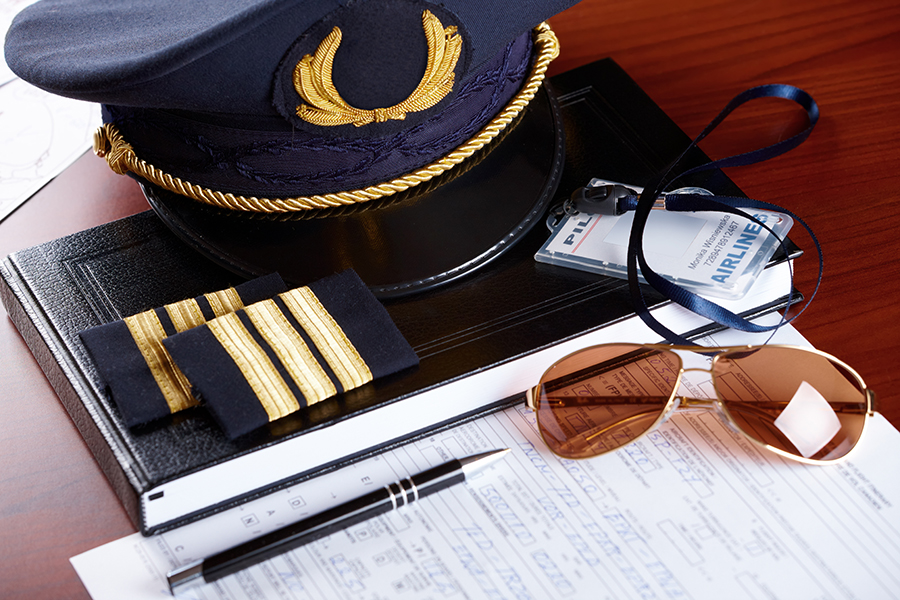-
What Information Should I Include on My Pilot CV?
- Name and Contact Details
- Licenses and Ratings
- Flight Hours
- Work History
- References
- Relevant Education
- Personal Information and Achievements
-
How Do I Write a Pilot Resume? 9 Top Tips
- Give a Snapshot, Not a Story
- Photographs?
- Spelling and Grammar
- Highlight Your Good Points
- Avoid Walls of Text
- Avoid Cliches on Your Pilots CV
- Bullet Points for the Win
- Keep it Relevant
- One Page and One Page Only
- Choose Your References Carefully
-
What Skills Should a Pilot Have?
- Safety
- Responsibility
- Leadership
- Good Communication
- Teamwork and Crew Resource Management Training
- Technical Knowledge
- Good Punctuality
- Customer Focused
-
What Should a Pilot CV Look Like? - Example CV
-
Conclusion
Often, the first step to getting a job as a pilot starts with submitting your pilot CV or resume to an employer. While it is a simple document, it carries vital importance. Having a good CV can make a massive difference between getting an interview and not. Today we will offer some expert guidance on writing a pilot CV and even include an example and some top tips to ensure your resume gets to the top of the pile.
What Information Should I Include on My Pilot CV?
No two pilot CVs are alike. While there is a certain amount of leeway with the information you include, there are a few items that you will definitely want to ensure feature on your resume. Here are the minimum items that your CV should include.
Name and Contact Details
Many see including their name and contact details on a pilot cv as purely a convention.
Nothing could be further from the truth.
Your pilot CV is essentially your ‘advertisement’ to an employer, and you want to make sure that your name stands out!
Be sure to include your name at the top of the page, preferably in larger writing, almost like a headline. If an employer can’t see (or remember) your name, it already starts you off on the back foot!
Contact details are vitally important too. Check (and then double-check) that they are correct and are easy to see and understand. You might be the ideal candidate, but if an employer can’t easily find a way to contact you, then you won’t get the call.
Licenses and Ratings
This is one of your best selling points, so you want this near the top. Before employers read through pilot CVs in detail, they will vet them to see if applicants have the minimum experience required to satisfy the job criteria.
It makes sense when you think about it…
Why waste time reading the resume of someone who doesn’t have the required rating or experience?
You will want to make sure that your professional qualifications are the first thing an employer sees. Ensure the licenses and ratings you hold are in an easy-to-read format and easily visible.
Flight Hours
The mark of most aviation professionals is measured in-flight hours. If you have lots of hours, then, just like the ratings, this is something that you will want to showcase.
When mentioning hours on your pilot CV, the key is to make sure the information is understandable and organized. Interviewers won’t want to try and decipher what experience you have. Make it easy for them.
Work History
In a security-conscious industry like aviation, employers will want to see full work history without gaps. Showing your previous employers in chronological order will allow your chosen company to gain a real insight into who you are and what you’ve done at a glance.
References
References are vitally important. Anybody can manufacture a CV and walk into an interview. Employers will want proof that you are who you say you are.
As a general rule, most employers prefer at least two references to be given. It is the standard form to include at least one professional reference from a former company. If this is your first time applying for an aviation job, then be sure to include someone in a position of responsibility who can vouch for your credentials.
Relevant Education
Education is important, and it shows that you can apply yourself to learning (which is a great skill to have in aviation).
However.
Read the above title again.
Relevant education.
Few employers will be interested in your attendance at Sunday school when you were 6 years old. So, keep the information relevant and in chronological order, starting with the latest educational institution.
Also…
Be sure to include any extracurricular courses you may have taken. This is especially true if they are aviation-related.
Courses like what?
You’d be amazed at what you could learn in your own time at home.
Personal Information and Achievements
There will be a fair amount of competition with most aviation jobs, and employers may have a pile of pilot CVs to work through.
You might stand out against the crowd by adding a little personal information. It will allow employers to gain a real insight into the kind of person you are.
There is no need to go overboard. Perhaps a couple of sentences about your interests outside of work?
If you have genuinely achieved something in the course of your life, and you feel it really would help your application, why not include it?
How Do I Write a Pilot Resume? 9 Top Tips
You’ll no doubt have read countless tips on CVs and resumes, and everyone has their own different ideas as to what to include. Your pilot CV is perhaps your single shot at catching an employer’s attention, so you will want it to be good. Here are some top tips to ensure your pilot CV shines: –
Give a Snapshot, Not a Story
The time to tell a potential employer all about yourself is at the interview. You can consider your CV as an introduction, and there will be plenty of time to go into detail once you get a call.
Employers, especially in very competitive fields like aviation, simply don’t have time to be reading volumes about each candidate.
So, here is our advice…
Keep it simple!
Highlight the most important points only. If an employer is interested, they will ask you to elaborate in person.
Photographs?
It is entirely up to you whether you include a photograph. Adding a picture allows a potential employer to put a face to the name. However, people tend to make first impressions based on what they see, which could be a risk.
If you want to stay on the safe side, don’t feel you have to include a picture.
If you do want to include a picture, follow these guidelines: –
- Ensure that your picture is recent.
- Choose a professional picture, ideally one where you are wearing formal attire.
- You aren’t looking to win an award from National Geographic. Action shots are not required.
- Don’t go overboard on filters. Natural is best.
Spelling and Grammar
As a pilot, you are expected to be fastidious and meticulous. Spotting errors is certainly one thing you’ll be required to do in your professional life.
But…
Suppose your pilot CV is littered with spelling mistakes and errors. Why would an employer think you’d be any different in a professional capacity?
The answer?
Double and then triple-check your CV for errors and mistakes. Most employers take a very dim view of applications with obvious errors.
Highlight Your Good Points
What would you say if you had three sentences to describe your best points?
Ideally, you want to showcase your best side. There may be a lot to talk about. However, we’d advise that you prioritize those skills that are strictly relevant to the job. You can see an example of some of these skills below. See which criteria you are skilled in, and give it your own personal twist.
Avoid Walls of Text
By submitting your pilot CV, you are trying to impress your employer.
Nobody likes reading volumes about a person that they haven’t yet met.
How do you feel when you read something with a wall of text?
Bored, most likely.
Employers feel the same way. Tell them what they need to know, keep it super relevant, and try to avoid going into too much detail.
Avoid Cliches on Your Pilots CV
If there’s one thing that airline employers hate, it is cliches. Be original in who you are and allow your personality to shine.
Avoid meaningless ‘corporate speak’ or any other terms that interviewers have likely seen before. This includes things such as: –
- “I work well on my own or as part of a team” (this doesn’t actually tell an employer anything)
- “I’m motivated” (who isn’t?)
- “I give 110%” (But what do you achieve?)
- “I’m results-driven” (Pilots should be safety-driven)
- “A blue-sky thinker” (what does this even mean?)
Bullet Points for the Win
An easy way to get your point across is to use bullet points. Consider the following examples and see which you think is best: –
“Upon graduating flight school, I was granted the “flyer of the year” award. This award was a recognition of my leadership skills along with my continued ability to excel in areas such as airmanship and safety. I also graduated the course in the shortest time possible, proving that I can take in information and understand it quickly.”
Or…
“Skills and Attributes:
- Granted flyer of the year award
- Proven leadership skills
- Strong emphasis on airmanship and safety.”
The latter tells an employer everything they need to know without being hard to read or too verbose.
Keep it Relevant
While you may be particularly proud of your voluntary work at an animal shelter or that you visit grandma every week for tea and biscuits, your employer is interested only in things that make you suitable for that particular job.
While both of the above are admirable, they don’t demonstrate how great a pilot you are.
The bottom line is…
Keep your pilot CV and the skills mentioned within, relevant for the position you are applying for.
One Page and One Page Only
If you’ve followed the above advice, this should be no problem.
While it isn’t a deal-breaker, a good pilot’s CV should ideally be one page only.
Employers are much more likely to read through your entire pilot resume if they know it is only one page.
As an additional plus, limiting yourself to one page ensures that you stay concise and to the point.
Choose Your References Carefully
Your best friend may vouch for you and be very close to you. However, how are they likely to behave if called by your future employer?
This is something well worth thinking about.
You need to choose your referees carefully and not take chances. How distressing would it have been to have landed the job, only for it to be torpedoed by an unreliable reference?
While on the subject of references, if in doubt, keep it professional. No employer is going to see the funny side, or your best side if they are required to email [email protected].
What Skills Should a Pilot Have?
A pilot, such as yourself, should, and undoubtedly will have plenty of valuable skills. If you are stuck for ideas, or just need a little inspiration, here’s a great list of skills that airlines and aviation employers love to see on a pilot CV: –
Safety
We’ve included this first for a reason.
Airlines love nothing more than a pilot who is safety conscious. Above all else, if you are a safe operator, that goes a long way with employers. After all, if your pilot CV passes muster, you might find yourself at the control of something that costs millions of dollars and responsible for the 200 or so people in the back too!
Responsibility
As a pilot, you will eventually be the commander of the aircraft. This comes with a huge amount of responsibility.
In short…
The buck stops with the aircraft captain, and employers prefer people who accept and acknowledge this responsibility.
If you can think of situations or roles where this ethos has been apparent, include it on your pilot CV!
Leadership
As a pilot, you will be in a position of authority. While delegating tasks is part of the role, airlines and aviation employers look for individuals who are leaders and make safe decisions for the greater good.
It doesn’t matter if you don’t currently have experience of this, try and think of situations that show that you could develop into a leader, and include them on your CV. This might be something as trivial as being captain of the high school football team or presenting to colleagues.
Good Communication
Most large airplanes require a multi-crew environment, and even smaller aircraft are required to communicate with air traffic control.
Regardless of the capacity in which you are applying, be sure to emphasize how good a communicator you are!
Teamwork and Crew Resource Management Training
The days of airplane captains being ‘above god’ are thankfully gone. In its place, pilots are expected to work within a team.
Crew resource management is a valuable safety tool that has become popular over the last 20 years. The overall aim is to increase flight safety. The focus of CRM is utilizing others’ strengths and negating weaknesses within a team. If you haven’t heard of CRM before, then it is a concept that is well worth researching.
Technical Knowledge
Technical knowledge regarding airplanes is a wonderful attribute. It will make you a better pilot, but it also shows employers that you have a passion for aviation.
Why?
The only way to gain expert technical knowledge is by studying. Even if you aren’t technically minded, it doesn’t hurt to occasionally read a little into your aircraft or those you may want to fly. With a little research, you’ll often be able to find free aviation courses that will allow you to broaden your skills.
Good Punctuality
As the old (slightly cliched) saying goes, “Time is Money”. In aviation today, this has never been more true.
Punctuality is seen as a real virtue by employers. A good concept of timekeeping is a crucial skill required by pilots.
Customer Focused
If you seek an aviation career in the commercial sector, you become more than just a pilot. You are literally an ambassador for your chosen company.
As we said above, any problems onboard come to rest straight at the pilot’s feet. If you have ever been in a role that required you to show good customer focus and service, it should be mentioned on your pilot CV.
What Should a Pilot CV Look Like? – Example CV
With all of the above in mind, we have assembled a pilot CV template to give you a good idea of what it should look like.
You might even recognize the individual on who we based it.
Conclusion
A good pilot CV should be concise, easy to read, and free of errors. It should also highlight positive attributes, such as those mentioned above, that are super relevant to the role to which you are applying. Not at the stage where you are applying for jobs yet? Don’t worry. The journey to becoming a pilot starts with small steps. Why not read about other people we’ve helped start their journey, with here?



